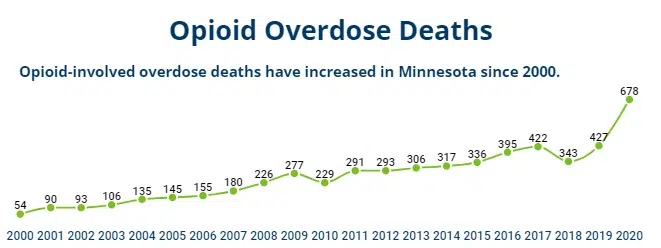 This month during National Substance Abuse Prevention Month, Essentia Health with Leighton Broadcasting and LAKES TV3 are bringing you a series to learn more about the opioid crises in our communities. What are opioids? Why is this happening? What can we do about it? How can we help? These are some of the questions we’re tackling in this series.
This month during National Substance Abuse Prevention Month, Essentia Health with Leighton Broadcasting and LAKES TV3 are bringing you a series to learn more about the opioid crises in our communities. What are opioids? Why is this happening? What can we do about it? How can we help? These are some of the questions we’re tackling in this series.
OPIOID USE IN MINNESOTA
Opioid use is the most rampant drug problem in the United States and is affecting people in our communities including Becker, Hubbard, Mahnomen, Polk, and Norman counties. An average of 191 people died every day in the US in 2020 from an opioid overdose, that’s roughly 1 person every 7-8 minutes.

via Minnesota Department of Health
In addition to the crushing number of preventable deaths, even more people are affected by related problems like homelessness, losing and unable to keep jobs, skipping or dropping out of school, and family chaos.
WHAT ARE OPIOIDS?
Opioids are a class of drugs naturally found in the opium poppy plant and that work in the brain to produce a variety of effects, including the relief of pain. Opioids can be prescription medications often referred to as painkillers, or they can be so-called street drugs, such as heroin. Many prescription opioids are used to block pain signals between the brain and the body and are typically prescribed to treat moderate to severe pain. In addition to controlling pain, opioids can make some people feel relaxed, happy or “high,” and can be addictive.
The most commonly used opioids are:
- prescription opioids, such as OxyContin and Vicodin
- fentanyl, a synthetic opioid 50–100 times more potent than morphine
- heroin, an illegal drug
WHY IS THIS HAPPENING?
The rise in opioid overdose deaths has come in three waves.
It started in the mid-1990s when OxyContin triggered the first wave of deaths linked to legally prescribed opioids. Then came a second wave of deaths from a growing heroin market for already addicted people. More recently, a third wave of deaths has arisen from illegal, synthetic or man-made opioids like fentanyl.
Fentanyl is an opioid that’s 50 and 100 times more potent than heroin and prescription opioids. While Fentanyl is primarily used in terminally ill patients, they’re increasingly being illegally manufactured and distributed alongside—or mixed with—illegal drugs like heroin, counterfeit pills, and cocaine. Fentanyl has the power to kill with just 2 milligrams when its ingested. To put that in perspective, a sugar packet found on a restaurant tabletop generally contains 1,000 milligrams per packet.
Recently, many communities in northwestern Minnesota have seen a significant increase in opioid related overdoses and deaths. While law enforcement works to find those people responsible for bringing these harmful drugs into our communities we also need help from the public to end these preventable tragedies.
HOW DOES OPIOID ADDICTION OCCUR?
Anyone who takes opioids even short-term is at risk of developing addiction and, too often, experiencing an overdose. Addiction for some can start with taking just one pill. When you take opioids repeatedly over time, your body slows its production of endorphins. The same dose of opioids stops triggering such a strong flood of good feelings like exhilaration and happiness. This is called tolerance. One reason opioid addiction is so common is that people who develop tolerance may feel driven physically and emotionally to increase their doses to chase that initial high, numbing, or a relaxed feeling.
Opioid addiction is the hardest addiction to break and the hardest one to overcome. Withdrawals are extreme and you must be under medical supervision to withdraw safely. You can’t just stop using opioids once your body is dependent on them or you will die.
If you or a loved one is struggling with Opioid use, Essentia Health can help. Essentia Health’s team provides compassionate and personalized care for people using opioids. Call the Essentia Health 24/7 Substance Use Disorder Referral Line at 8330677-12-62 or visit EssentiaHealth.org/SubstanceUseDisorder to learn more.
To watch the full series, go to Lakestv3.com
This project was supported by Grant No. 2017-AR-BX-K003 awarded to the Institute for Intergovernmental Research (IIR) by the Bureau of Justice Assistance. The Bureau of Justice Assistance is a component of the Department of Justice’s Office of Justice Programs, which also includes the Bureau of Justice Statistics, the National Institute of Justice, the Office of Juvenile Justice and Delinquency Prevention, the Office for Victims of Crime, and the SMART Office. Points of view or opinions in this document are those of the author and do not necessarily represent the official position or policies of IIR or of the U.S Department of Justice.





